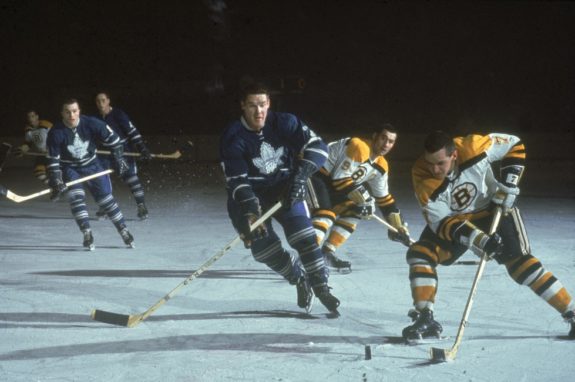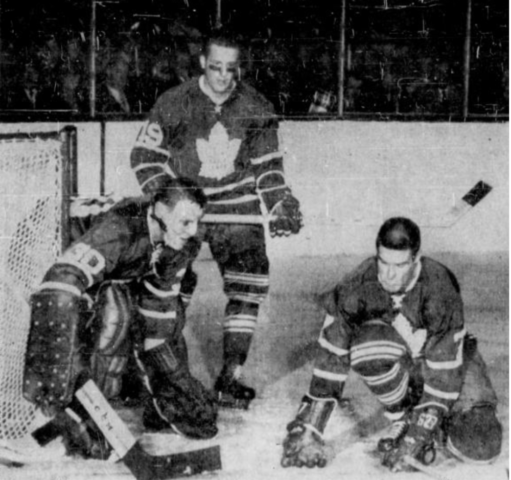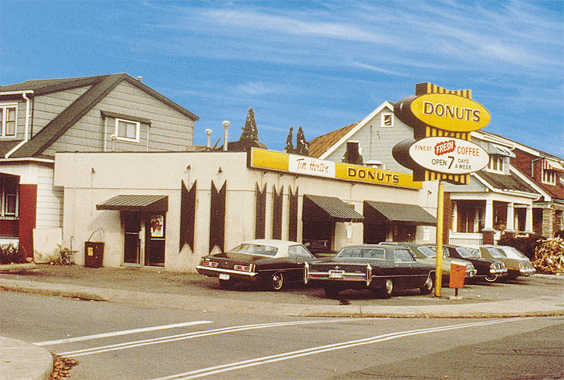Miles Gilbert Horton, better known as “Tim” Horton thanks to a nickname his mother gave him before giving birth, was born on Jan. 12, 1930, in Cochrane, Ontario, a mining region in the north of the province. Horton stood out from the crows in a lot of ways, including from the first time he laced up the skates. He enjoyed a successful junior career and was named the top defenseman in the Ontario Hockey Association in 1949 for his performance with the St. Michael’s Majors.
Sign up for our NHL History Substack newsletter
He’s known for more than just hockey, though – you might know him as the most recognizable name in coffee and donuts in all of Canada, too. As a 24-year veteran of the NHL and a successful businessman, he made an impact in more ways than one, and the legacy he left behind has made him remembered by millions.
The Man They Called “Superman”
Horton was widely considered one of the strongest, toughest players in the NHL, whether you were playing with or against him. This earned him the nickname “Superman,” coined by legendary Toronto Maple Leafs goaltender and a longtime teammate of his, Johnny Bower. Bower believed Horton could lift a 40-gallon oil drum over his head, without actually ever seeing him complete this feat. Fellow Leafs legend and teammate Dave Keon once recalled Horton throwing railroad ties around “like they were toothpicks.” Perhaps more unbelievable than that was Leafs defenseman Bob Baun’s recounting of an instance when he saw Horton lift barrels of cement and barricade an intersection in Quebec.

Aside from the off-ice tales and stories, Horton also earned praise for his strength on the ice. In fact, Gordie Howe – “Mr. Hockey” himself – called Horton “the strongest player in hockey.” That’s quite the compliment from Howe. He also earned compliments from another dynamic and legendary forward, Bobby Hull, who also praised his strength.
I figured I was a pretty strong guy after a summer of work on my farm. Then I’d go against Horton.
Bobby Hull
What’s fascinating is that Horton’s eyesight was reportedly so poor that, off the ice, he had to wear thick-framed glasses in his regular life, much like Superman’s alter ego Clark Kent. That earned him that nickname, too, truly fitting for what he did on the ice and how he acted off it.
Horton: One of the 100 Greatest NHL Players
In 2017, the NHL celebrated its 100th anniversary of existence and commemorated its anniversary with a list of the 100 Greatest NHL Players. Among those 100 players named to this esteemed list by a panel of hockey executives, members of the media, and NHL alumni, was none other than Horton.
Horton played 1,446 games over 24 NHL seasons, scoring 115 goals, 403 assists, and 518 points. His 518 points rank 64th all-time among NHL defensemen, placing him comfortably among the greatest defensemen to ever play the game.
After spending three seasons in the American Hockey League (AHL), Horton played his first full season with the Maple Leafs in the 1952-53 season. He quickly became an offensive threat from the backend, boasting a lethal shot and scoring ability that was uncommon for defensemen at that point in time. “I remember his coming in and you’d start to take it waist-high and it comes up a little higher, a little higher and finally at the end, you’d duck out,” said former Chicago Blackhawks goalie Glenn Hall on Horton’s shot. He wasn’t just known for his shot, though. He also possessed stellar passing and was clutch in big moments when it most mattered.
Related: A Common Ground: Where Hockey Meets Coffee
Horton won four Stanley Cups with the Maple Leafs in his time with the team, the first of which came in 1962, their first Cup championship in 11 seasons. He scored three goals and 13 assists for 15 points in 12 playoff games, setting a record for most points by a defenseman in one playoff season, with the point that set the record coming off a pass that set up the Cup-winning goal in Game 6 of the Stanley Cup Final against the Blackhawks.
He had a great shot at a time when defensemen didn’t have great shots.
Glenn Hall
Horton spent nearly 20 years as a Maple Leaf, but he bounced around a couple of different NHL teams in the later part of his career. After the Leafs’ Stanley Cup win in 1967, the last Cup they’ve won, they retooled the team, which included parting ways with him. He played parts of two seasons with the New York Rangers and then was claimed by the Pittsburgh Penguins in the Intra-League Draft in 1971. He was then claimed in the Intra-League Draft the following year in 1972 by the Buffalo Sabres, the last team he would play for.
The “Horton Bear Hug”
Horton was as tough as they come, but there’s one thing he never was: a dirty player. Instead of playing mean and dirty like some of the most famous agitators in NHL history, he relied on his massive strength and old-school toughness to outmuscle his opponents and play the game the right way, all while remaining incredibly difficult to play against. At the same time, he was able to calm down the game and play the game at his own pace, all making for the truly great player that he was.

In the Canadian ten-part/ten-hour documentary mini-series Legends of Hockey, released in 2001 and featuring prominent members of the hockey world profiling the history of hockey, former Detroit Red Wings player Norm Ullman spoke on fighting Horton during the era they played in.
You may also like:
NHL Rumors: Blues, Bruins, Canucks, Maple Leafs
Dear Santa: Maple Leafs’ 2021 Christmas Wish List
Maple Leafs Daily Download – Recap, Stats, Injuries & News
Dear Santa: Sabres’ 2021 Christmas Wish List
Sabres Daily Download – Recap, Stats, Injuries & News
“Fighting Tim Horton? I can’t really remember him in a punch-up,” Ullman said on “Legends of Hockey.” “Most opponents, even the toughest, avoided him because when he got close and had a chance to put those arms around you, you were done.”This tactic of Horton’s that Ullman described was referred to as the “Horton Bear Hug,” a fitting name for what equated to a bear wrapping its arms around you.
The Horton Bear Hug! It makes me shiver a little just to think about seeing a guy caught in it.
Norm Ullman
Those who dared to mess with Horton on the ice learned the hard way just how intimidating the Horton Bear Hug truly was. During a game in his rookie season, Boston Bruins center Derek Sanderson slashed Horton while forechecking in the offensive zone, and proceeded to do it again, earning the bear hug that was about to come his way.

“He put the bear hug on me and started to squeeze,” said Sanderson. “I heard my ribs groan and thought they were all going to crack. It really started to hurt, and then he let go and tossed me on my back like a towel. I never slashed him or challenged him again.” Horton might be Clark Kent off the ice, but as Sanderson learned, it’s better not to mess with Superman on the ice.
Tim Horton’s – A Legacy of Donuts & Coffee
Horton had a prolific NHL career, winning four Stanley Cup championships with the Maple Leafs and finishing as runner-up for the Norris Trophy twice, and earning recognitions as an NHL All-Star. However, the name “Tim Horton” is widely recognized today as the fast-food franchise serving up doughnuts and coffee.
Horton founded “Tim Horton Donuts” in 1964, establishing the first location in Hamilton, Ontario. He founded Tim Horton Donuts, later abbreviated to “Tim Horton’s” after an initial venture into the hamburger restaurant industry. He also had a brief stint of owning a sports car dealership, adding to the legend of the man that was Tim Horton.

It’s safe to say now that he made the right choice by switching over to coffee and doughnuts. In 2020, Tim Horton’s operated and franchised 4,949 restaurants worldwide, with 4,286 being in Canada. The second-largest amount of restaurants in any one country was 621, in the United States. Branded as “Tim Horton’s Cafe & Bake Shop” in the U.S., the restaurant chain is big in American border cities, such as Buffalo, New York, the last NHL city Horton played in in his NHL career.
Tim Horton – A Life Cut Tragically Short
After being claimed by the Buffalo Sabres in the 1972 intraleague draft, Horton played two seasons with the Sabres. He was reunited with former Maple Leafs coach and general manager (GM) George “Punch” Imlach, who became the coach and GM of the Sabres in 1970, just a few years earlier. Horton, who was 44 years old and in the twilight of his playing days when negotiating his new contract with the Sabres, was able to persuade Imlach to include a new sports car in the contact. Imlach reluctantly agreed, and Horton got his new car.
After a game on Feb. 20, 1974 against the Maple Leafs in Toronto, Horton was driving himself back across the border to Buffalo in that very car given to him as part of his new contract. While driving near St. Catharines, Ontario, he lost control of the car and proceeded to roll over several times before ultimately being killed. He was 44 years old.
Statistics & Trophies
Tim Horton’s list of accomplishments over his 24 NHL seasons is long, including his personal accolades and team accolades, alike. Although he never won the Norris Trophy as the NHL’s best defenseman, he did finish as runner-up on two separate occasions.
National Hockey League (24 seasons)
- Four Stanley Cup Championships (1962, 1963, 1964, 1967)
- Played in NHL All-Star Game (1954, 1961, 1962, 1963, 1964, 1968, 1969)
- NHL First All-Star Team (1964, 1968, 1969)
- NHL Second All-Star Team (1954, 1963, 1967)
American Hockey League (3 seasons)
- AHL First All-Star Team (1952)
The last game Horton played before his tragic death was his 1,446th regular season game, which stood as the NHL record for 25 years as the most games played by a defenseman. He was voted into the Hockey Hall of Fame in 1977.
